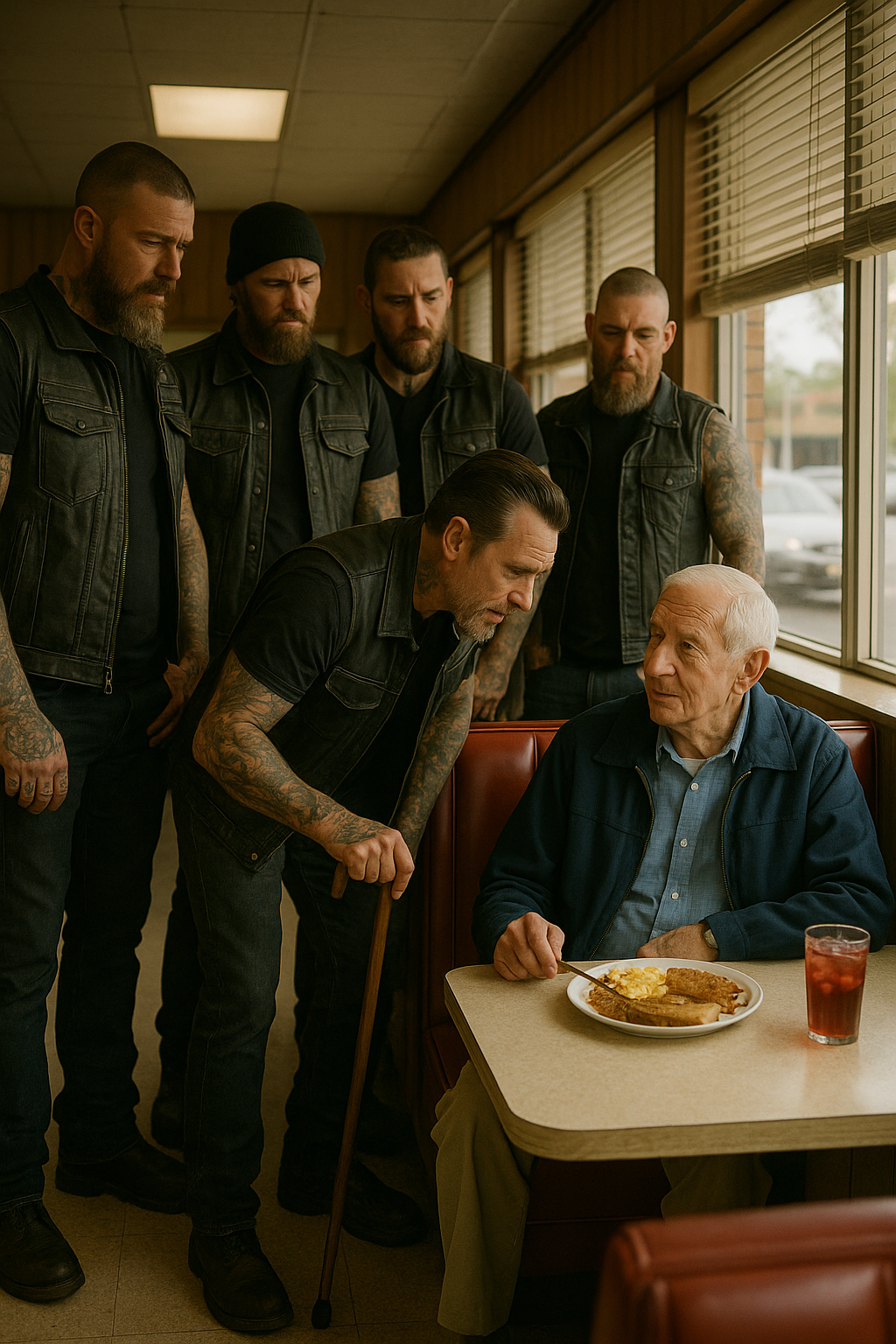
The morning sun had barely pierced through the pines when Maggie’s Diner opened for another quiet Sunday. The air smelled of sizzling bacon and sweet maple syrup, a small sanctuary of warmth for anyone who walked through the door.
Walter Davis stepped in, cane in hand, ninety years on the clock but carrying himself with a quiet dignity. His back was straight, his steps measured but deliberate, and his eyes carried decades of stories no one else could see. For twenty years, he had sat at the same window booth, ordering the same breakfast: black coffee and two pancakes, always greeted with a smile by Maggie.
“Morning, Walter,” she said, pouring his coffee. “Looking sharp today.”
Walter chuckled. “Trying to impress you, Maggie. I’ve been at it since 1945 — maybe today’s the day I succeed.”
Her laughter filled the diner, but peace has a way of shattering when arrogance storms in.
The door banged open. Five bikers—leather jackets, tattoos, attitude—strode in like they owned the place. Boots slammed against the floor. Their leader, a man with a snake tattoo coiled up his arm, grinned at Maggie.
“Five burgers. Extra grease. And make it snappy,” he barked.
Walter didn’t flinch. He continued sipping his coffee.
“Hey, Grandpa,” another biker sneered. “Lost your way? This isn’t your bingo night.”
Walter’s gaze lifted slowly, unwavering. “Just having breakfast, son. Nothing more.”
“Yeah, well, that’s our table,” the leader said, smirking.
Maggie hesitated. “That’s Walter’s booth. He’s been sitting there since before the diner even had paint on the walls.”
The bikers laughed. One snatched Walter’s cane and spun it like a toy. “Cute stick. Planning to fight us with that, old man?”
Walter raised a hand calmly. “No need, Maggie,” he said softly. Then, from his jacket, he pulled an old flip phone. “It’s Walter. Might need a little backup at the diner.”
He pressed a button. The bikers erupted in laughter. “What is that, a nursing home hotline?”
Walter didn’t answer.
Minutes later, a deep rumble cut through the diner. Engines. Many of them.
The laughter stopped. Outside, more than twenty motorcycles gleamed in the sunlight, lined up with military precision. Riders in black leather vests stamped “Iron Hawks Veterans Club” dismounted silently, filling the parking lot with presence and power.
A graying man strode inside. “Morning, Commander,” he said, saluting Walter.
The diner went silent. The bikers exchanged nervous glances.
“C-Commander?” stammered their leader.
“You’ve been disrespectful to Colonel Walter Davis, founder of the Iron Hawks and decorated Air Force veteran,” the man said, voice steady.
The bikers froze. Suddenly, the quiet old man before them wasn’t just any senior—he was a decorated war hero, a leader, a man who had commanded the skies in ways they couldn’t imagine.
Walter rose, straight and commanding. “You didn’t ask.”
The Iron Hawks stepped forward, a silent wall of authority.
“Apologize to the lady. Clean up your mess. Then leave,” the graying veteran said.
The bikers scrambled, muttering apologies, picking up fries, and polishing Walter’s cane with shaky hands.
Walter nodded. “Respect isn’t given because someone’s afraid of you. It’s given because it’s deserved.”
The Iron Hawks chuckled quietly outside. “Still got it, Commander,” one said.
“Not lost yet,” Walter replied, smiling faintly.
When the engines roared and the veterans rode off, Maggie looked after them, shaking her head. “You’d never guess,” she whispered, “that quiet old man just led pilots through enemy skies.”
Walter returned to his booth, sipping his coffee, calm as ever. Outside, the world was none the wiser, but inside, he had reminded a few young bikers what true courage looked like.


